NURS2098 Presentation: Mental Health Impacts of Migration in Australia
VerifiedAdded on 2023/01/09
|12
|1091
|77
Presentation
AI Summary
This presentation, prepared for the NURS2098 course, explores the significant impact of migration on the mental health of individuals, particularly within the Australian context. It highlights the challenges faced by migrants, including language barriers, cultural adjustment, and the potential for isolation and discrimination. The presentation discusses the psychological distress experienced by migrants, referencing relevant studies and research findings. Furthermore, it outlines the roles and responsibilities of nurses in supporting the mental well-being of migrants, emphasizing the need for cultural sensitivity, therapeutic relationships, and community engagement. The presentation also offers practical advice for migrants to facilitate their adaptation to a new cultural environment. Finally, it provides a conclusion summarizing the key points and emphasizes the importance of timely interventions to mitigate potential mental health issues. The presentation is supported by a comprehensive bibliography of relevant academic sources.
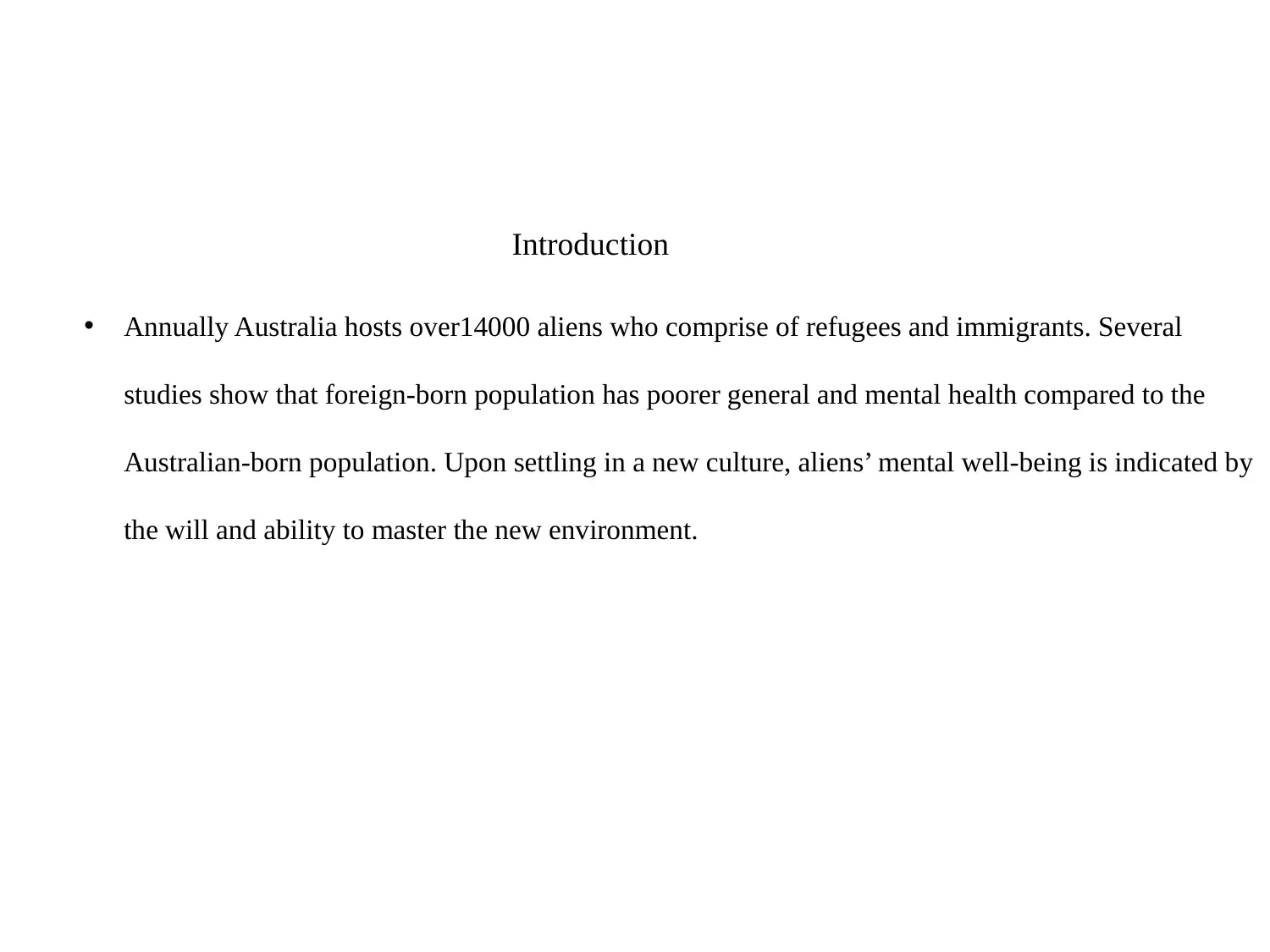
Introduction
• Annually Australia hosts over14000 aliens who comprise of refugees and immigrants. Several
studies show that foreign-born population has poorer general and mental health compared to the
Australian-born population. Upon settling in a new culture, aliens’ mental well-being is indicated by
the will and ability to master the new environment.
• Annually Australia hosts over14000 aliens who comprise of refugees and immigrants. Several
studies show that foreign-born population has poorer general and mental health compared to the
Australian-born population. Upon settling in a new culture, aliens’ mental well-being is indicated by
the will and ability to master the new environment.
Paraphrase This Document
Need a fresh take? Get an instant paraphrase of this document with our AI Paraphraser
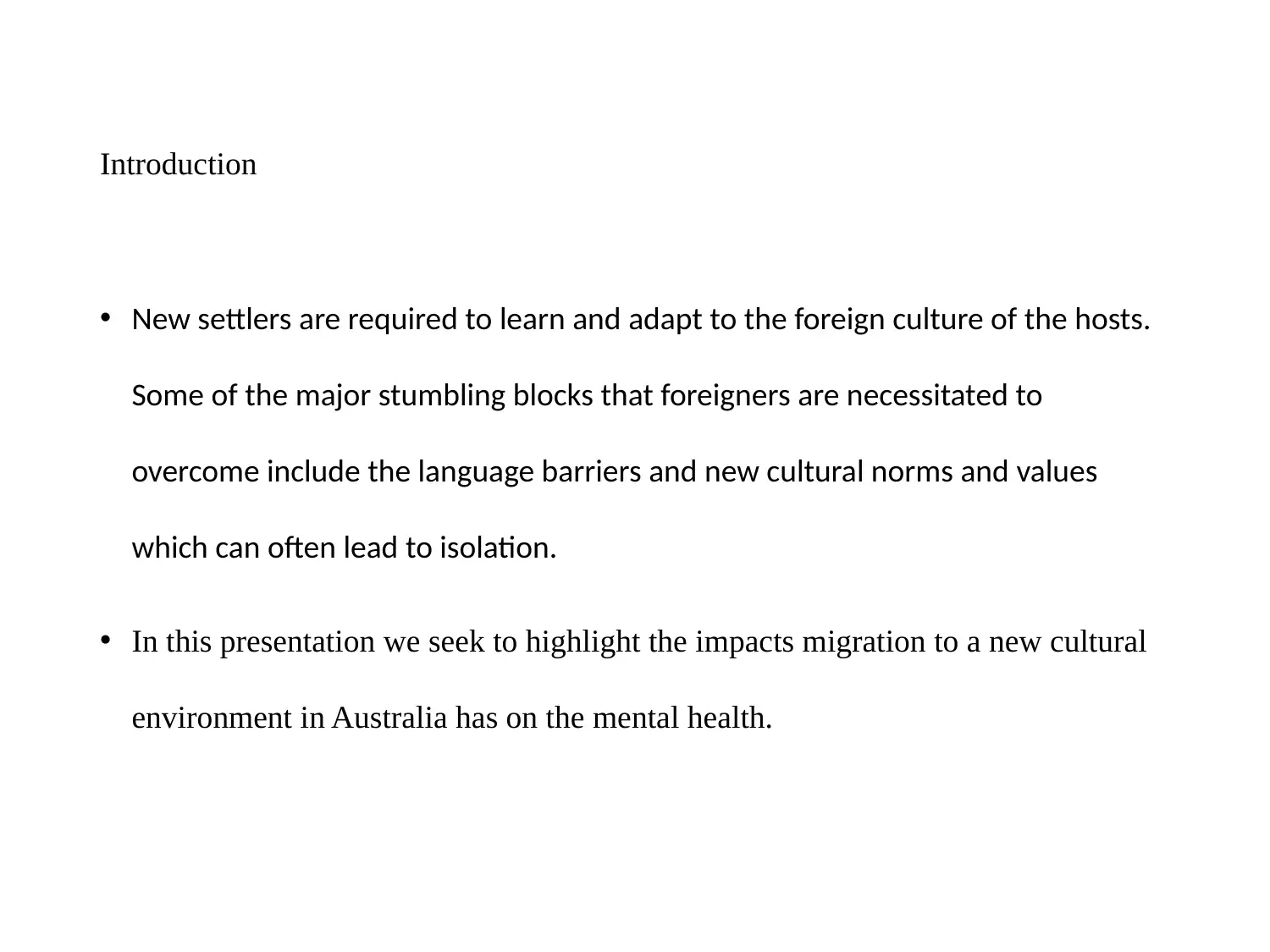
Introduction
• New settlers are required to learn and adapt to the foreign culture of the hosts.
Some of the major stumbling blocks that foreigners are necessitated to
overcome include the language barriers and new cultural norms and values
which can often lead to isolation.
• In this presentation we seek to highlight the impacts migration to a new cultural
environment in Australia has on the mental health.
• New settlers are required to learn and adapt to the foreign culture of the hosts.
Some of the major stumbling blocks that foreigners are necessitated to
overcome include the language barriers and new cultural norms and values
which can often lead to isolation.
• In this presentation we seek to highlight the impacts migration to a new cultural
environment in Australia has on the mental health.
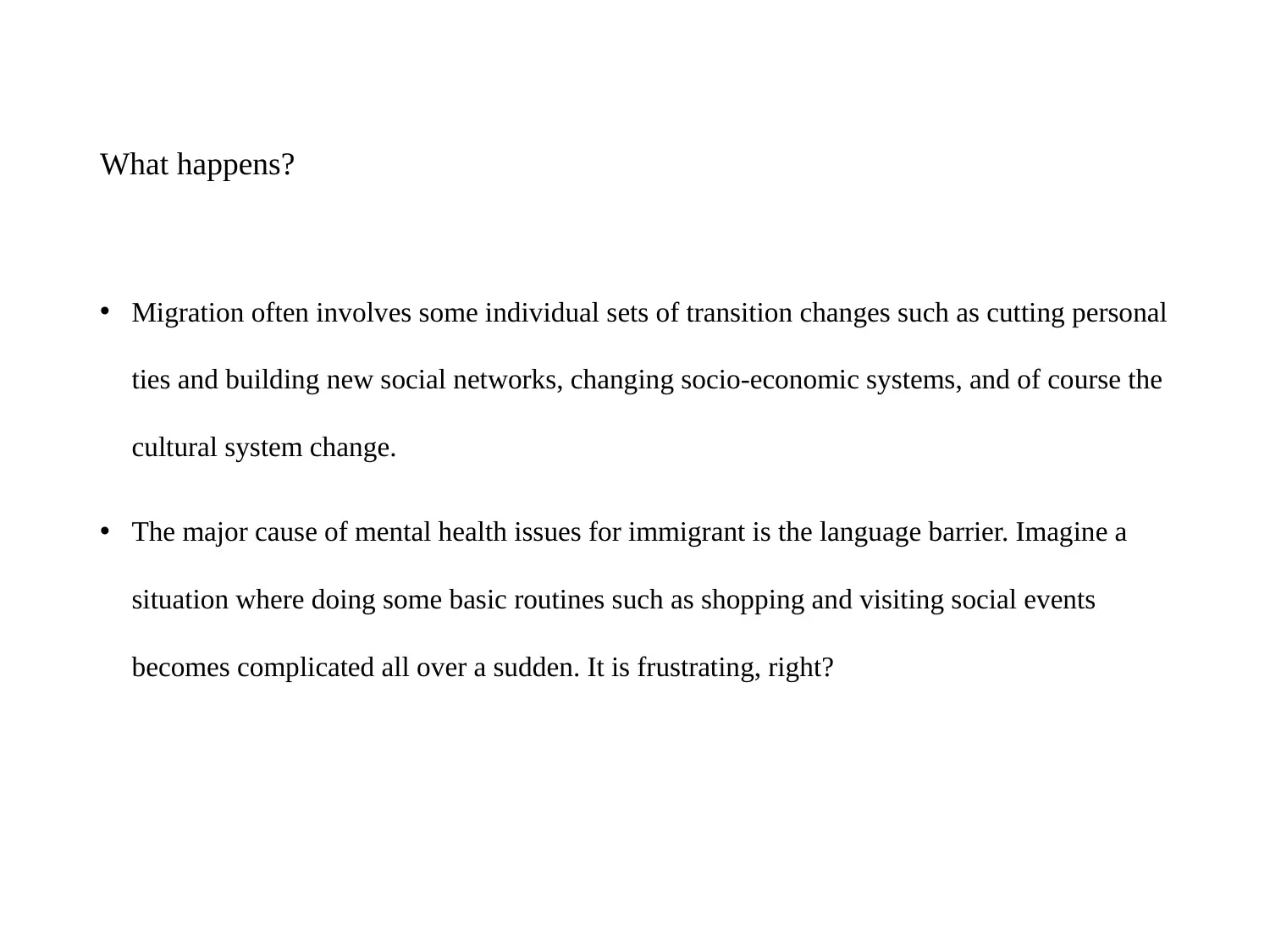
What happens?
• Migration often involves some individual sets of transition changes such as cutting personal
ties and building new social networks, changing socio-economic systems, and of course the
cultural system change.
• The major cause of mental health issues for immigrant is the language barrier. Imagine a
situation where doing some basic routines such as shopping and visiting social events
becomes complicated all over a sudden. It is frustrating, right?
• Migration often involves some individual sets of transition changes such as cutting personal
ties and building new social networks, changing socio-economic systems, and of course the
cultural system change.
• The major cause of mental health issues for immigrant is the language barrier. Imagine a
situation where doing some basic routines such as shopping and visiting social events
becomes complicated all over a sudden. It is frustrating, right?
⊘ This is a preview!⊘
Do you want full access?
Subscribe today to unlock all pages.

Trusted by 1+ million students worldwide
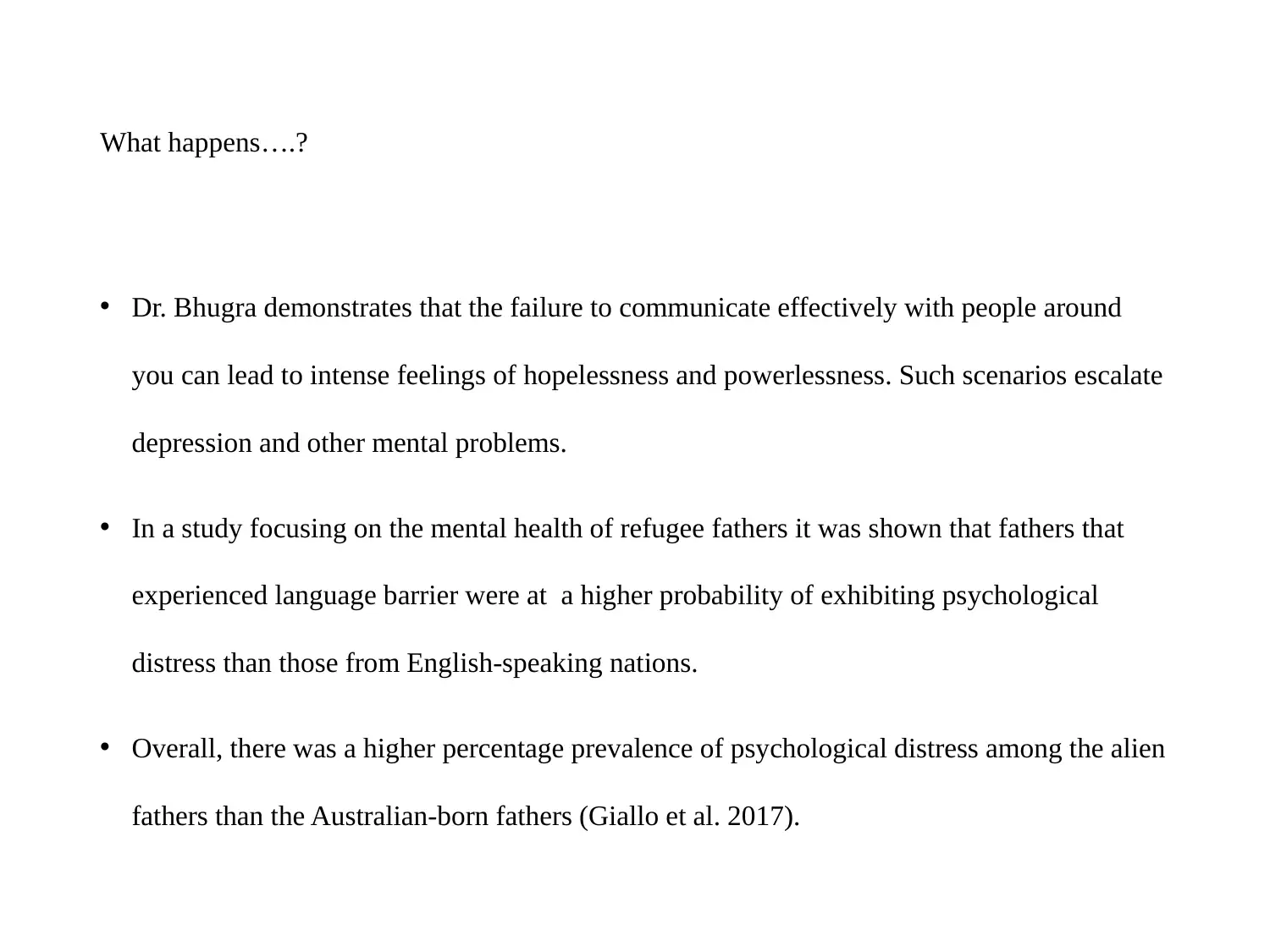
What happens….?
• Dr. Bhugra demonstrates that the failure to communicate effectively with people around
you can lead to intense feelings of hopelessness and powerlessness. Such scenarios escalate
depression and other mental problems.
• In a study focusing on the mental health of refugee fathers it was shown that fathers that
experienced language barrier were at a higher probability of exhibiting psychological
distress than those from English-speaking nations.
• Overall, there was a higher percentage prevalence of psychological distress among the alien
fathers than the Australian-born fathers (Giallo et al. 2017).
• Dr. Bhugra demonstrates that the failure to communicate effectively with people around
you can lead to intense feelings of hopelessness and powerlessness. Such scenarios escalate
depression and other mental problems.
• In a study focusing on the mental health of refugee fathers it was shown that fathers that
experienced language barrier were at a higher probability of exhibiting psychological
distress than those from English-speaking nations.
• Overall, there was a higher percentage prevalence of psychological distress among the alien
fathers than the Australian-born fathers (Giallo et al. 2017).
Paraphrase This Document
Need a fresh take? Get an instant paraphrase of this document with our AI Paraphraser
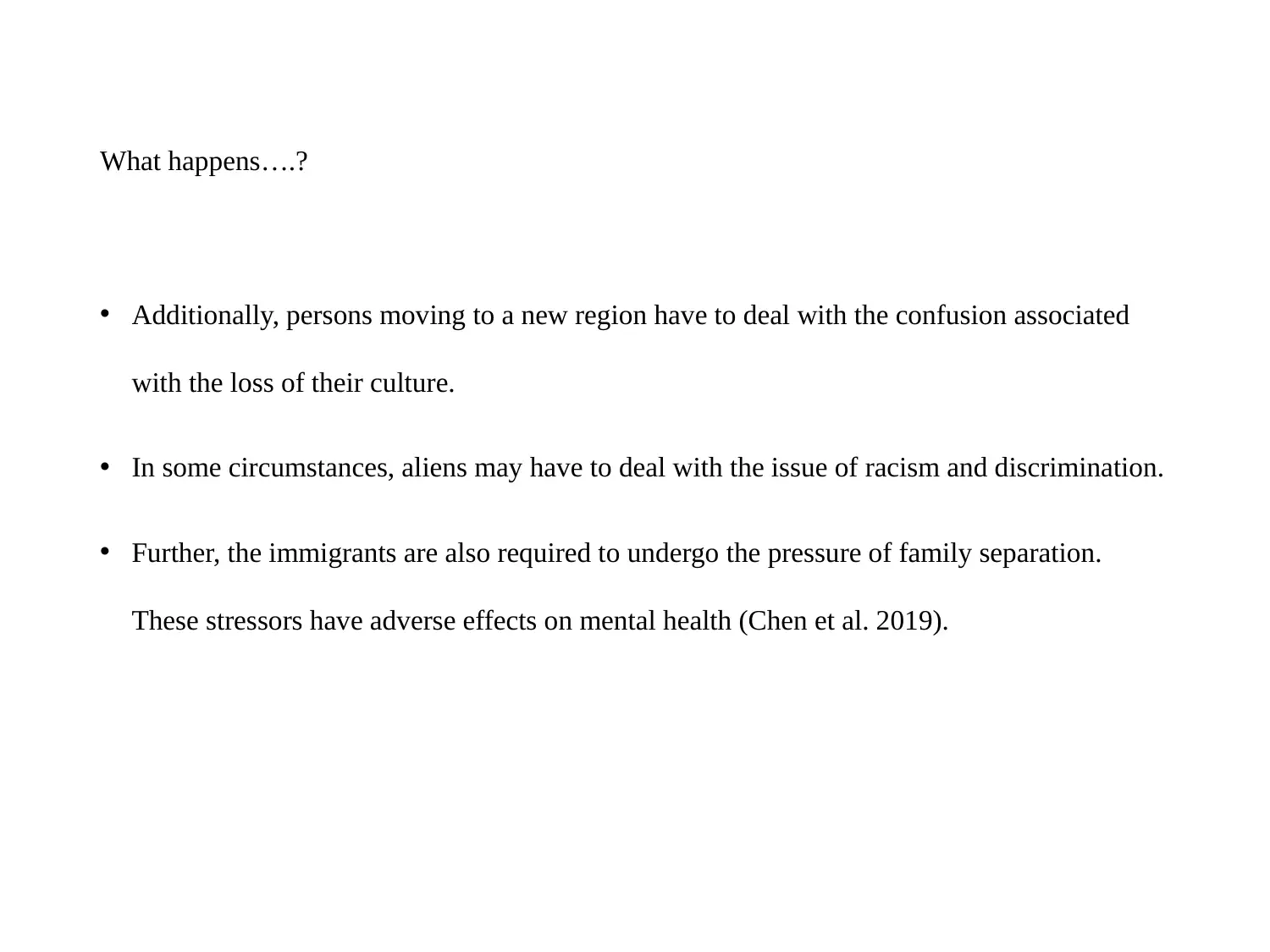
What happens….?
• Additionally, persons moving to a new region have to deal with the confusion associated
with the loss of their culture.
• In some circumstances, aliens may have to deal with the issue of racism and discrimination.
• Further, the immigrants are also required to undergo the pressure of family separation.
These stressors have adverse effects on mental health (Chen et al. 2019).
• Additionally, persons moving to a new region have to deal with the confusion associated
with the loss of their culture.
• In some circumstances, aliens may have to deal with the issue of racism and discrimination.
• Further, the immigrants are also required to undergo the pressure of family separation.
These stressors have adverse effects on mental health (Chen et al. 2019).
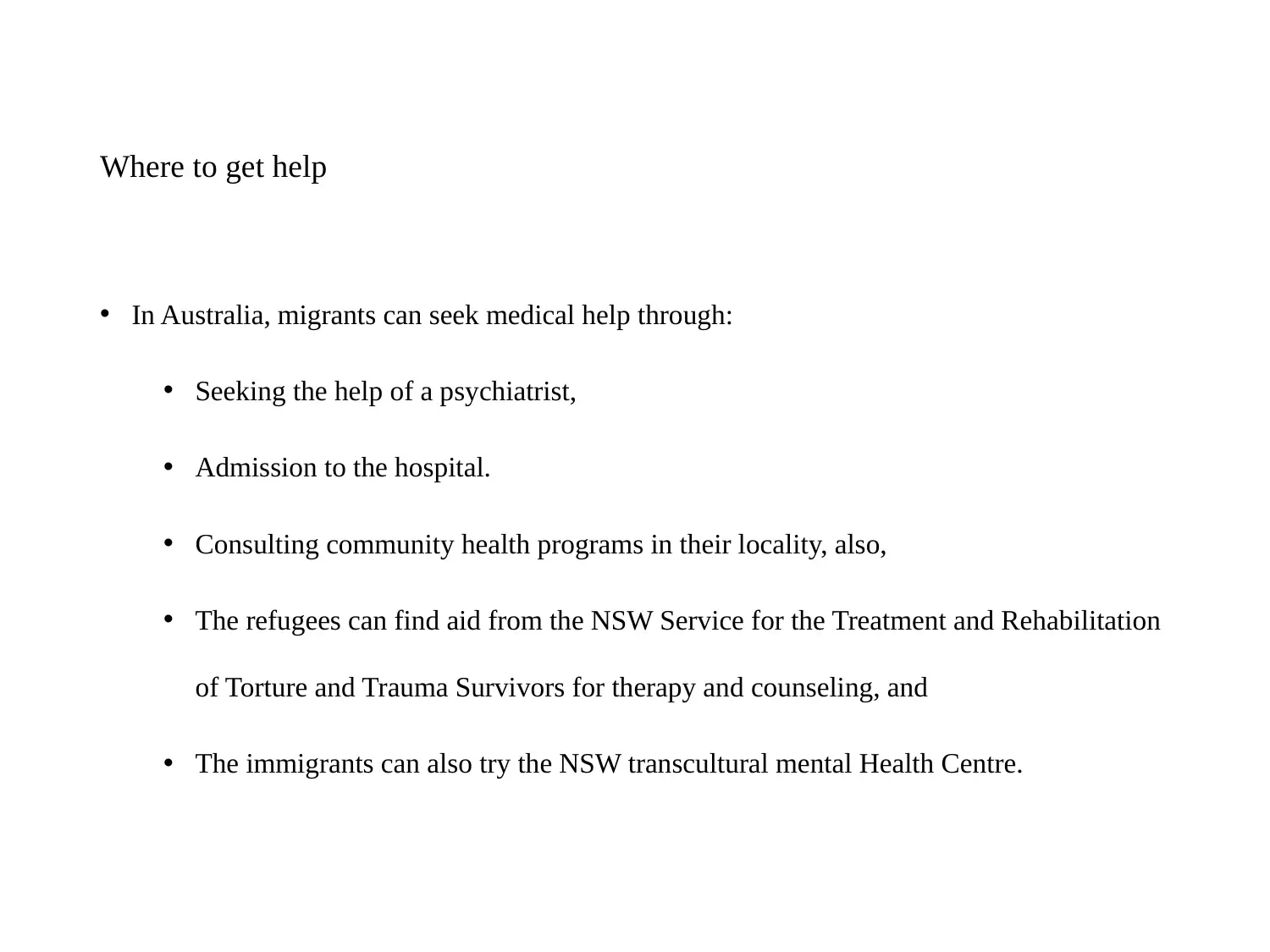
Where to get help
• In Australia, migrants can seek medical help through:
• Seeking the help of a psychiatrist,
• Admission to the hospital.
• Consulting community health programs in their locality, also,
• The refugees can find aid from the NSW Service for the Treatment and Rehabilitation
of Torture and Trauma Survivors for therapy and counseling, and
• The immigrants can also try the NSW transcultural mental Health Centre.
• In Australia, migrants can seek medical help through:
• Seeking the help of a psychiatrist,
• Admission to the hospital.
• Consulting community health programs in their locality, also,
• The refugees can find aid from the NSW Service for the Treatment and Rehabilitation
of Torture and Trauma Survivors for therapy and counseling, and
• The immigrants can also try the NSW transcultural mental Health Centre.
⊘ This is a preview!⊘
Do you want full access?
Subscribe today to unlock all pages.

Trusted by 1+ million students worldwide
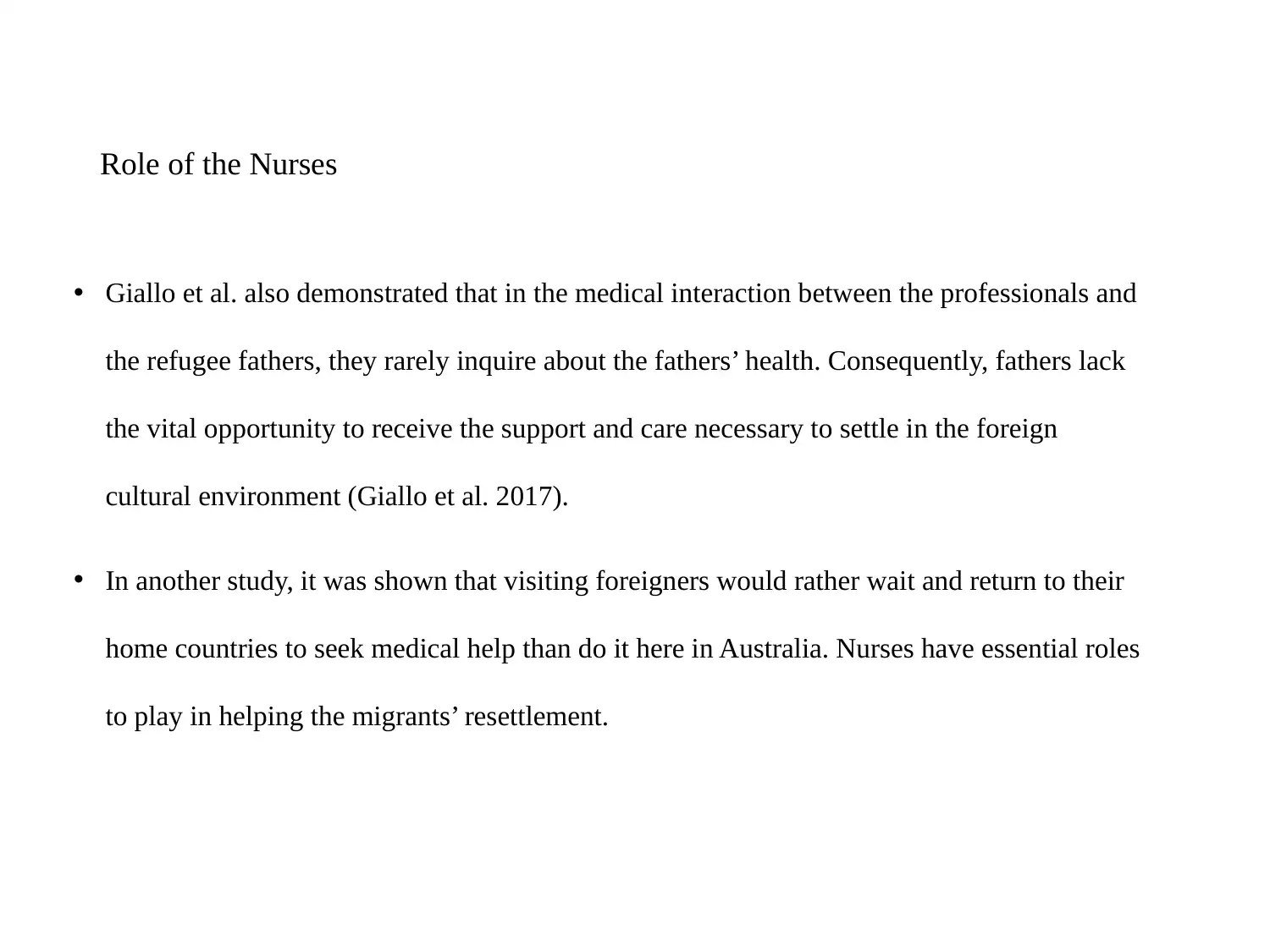
Role of the Nurses
• Giallo et al. also demonstrated that in the medical interaction between the professionals and
the refugee fathers, they rarely inquire about the fathers’ health. Consequently, fathers lack
the vital opportunity to receive the support and care necessary to settle in the foreign
cultural environment (Giallo et al. 2017).
• In another study, it was shown that visiting foreigners would rather wait and return to their
home countries to seek medical help than do it here in Australia. Nurses have essential roles
to play in helping the migrants’ resettlement.
• Giallo et al. also demonstrated that in the medical interaction between the professionals and
the refugee fathers, they rarely inquire about the fathers’ health. Consequently, fathers lack
the vital opportunity to receive the support and care necessary to settle in the foreign
cultural environment (Giallo et al. 2017).
• In another study, it was shown that visiting foreigners would rather wait and return to their
home countries to seek medical help than do it here in Australia. Nurses have essential roles
to play in helping the migrants’ resettlement.
Paraphrase This Document
Need a fresh take? Get an instant paraphrase of this document with our AI Paraphraser
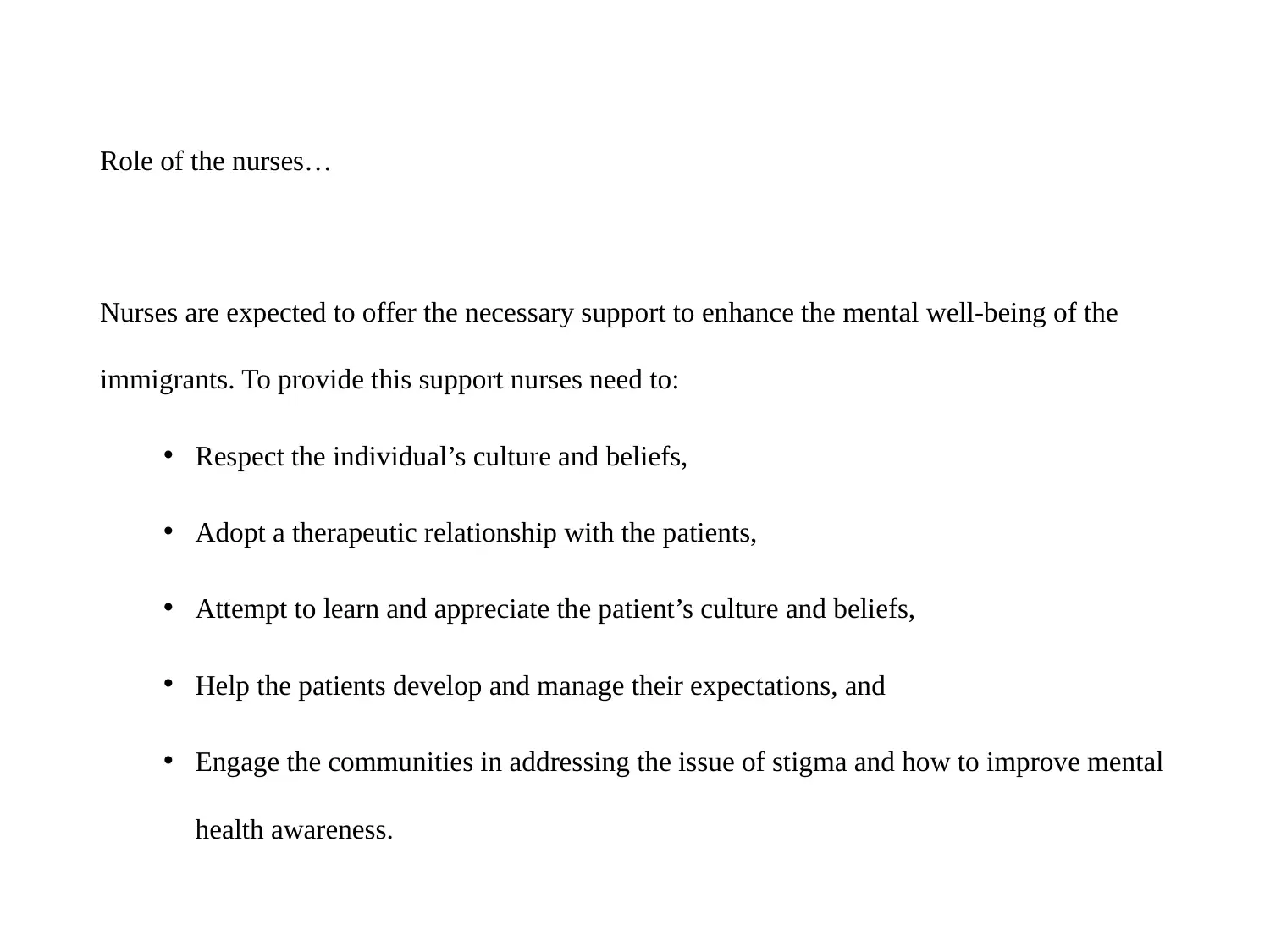
Role of the nurses…
Nurses are expected to offer the necessary support to enhance the mental well-being of the
immigrants. To provide this support nurses need to:
• Respect the individual’s culture and beliefs,
• Adopt a therapeutic relationship with the patients,
• Attempt to learn and appreciate the patient’s culture and beliefs,
• Help the patients develop and manage their expectations, and
• Engage the communities in addressing the issue of stigma and how to improve mental
health awareness.
Nurses are expected to offer the necessary support to enhance the mental well-being of the
immigrants. To provide this support nurses need to:
• Respect the individual’s culture and beliefs,
• Adopt a therapeutic relationship with the patients,
• Attempt to learn and appreciate the patient’s culture and beliefs,
• Help the patients develop and manage their expectations, and
• Engage the communities in addressing the issue of stigma and how to improve mental
health awareness.
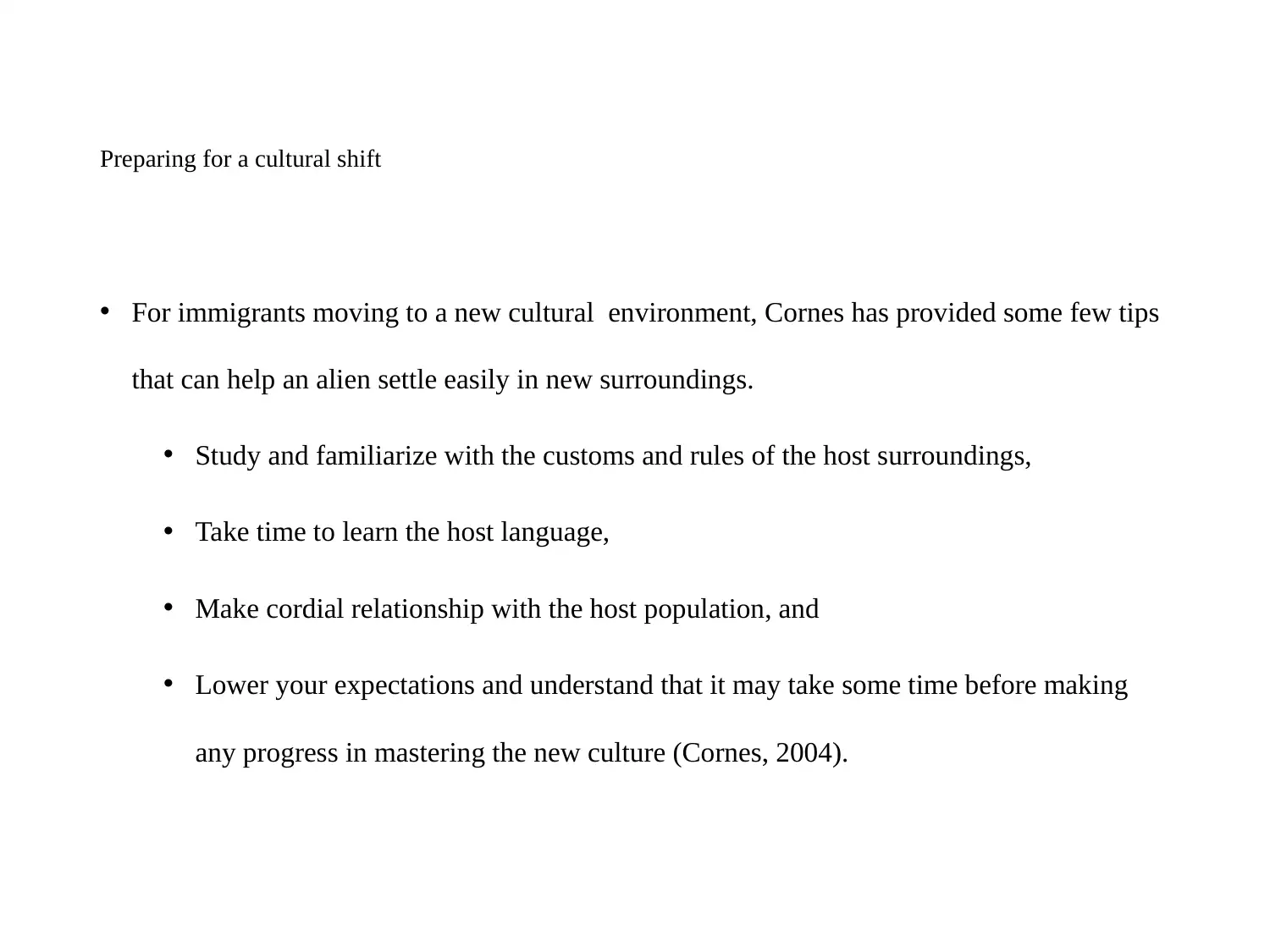
Preparing for a cultural shift
• For immigrants moving to a new cultural environment, Cornes has provided some few tips
that can help an alien settle easily in new surroundings.
• Study and familiarize with the customs and rules of the host surroundings,
• Take time to learn the host language,
• Make cordial relationship with the host population, and
• Lower your expectations and understand that it may take some time before making
any progress in mastering the new culture (Cornes, 2004).
• For immigrants moving to a new cultural environment, Cornes has provided some few tips
that can help an alien settle easily in new surroundings.
• Study and familiarize with the customs and rules of the host surroundings,
• Take time to learn the host language,
• Make cordial relationship with the host population, and
• Lower your expectations and understand that it may take some time before making
any progress in mastering the new culture (Cornes, 2004).
⊘ This is a preview!⊘
Do you want full access?
Subscribe today to unlock all pages.

Trusted by 1+ million students worldwide
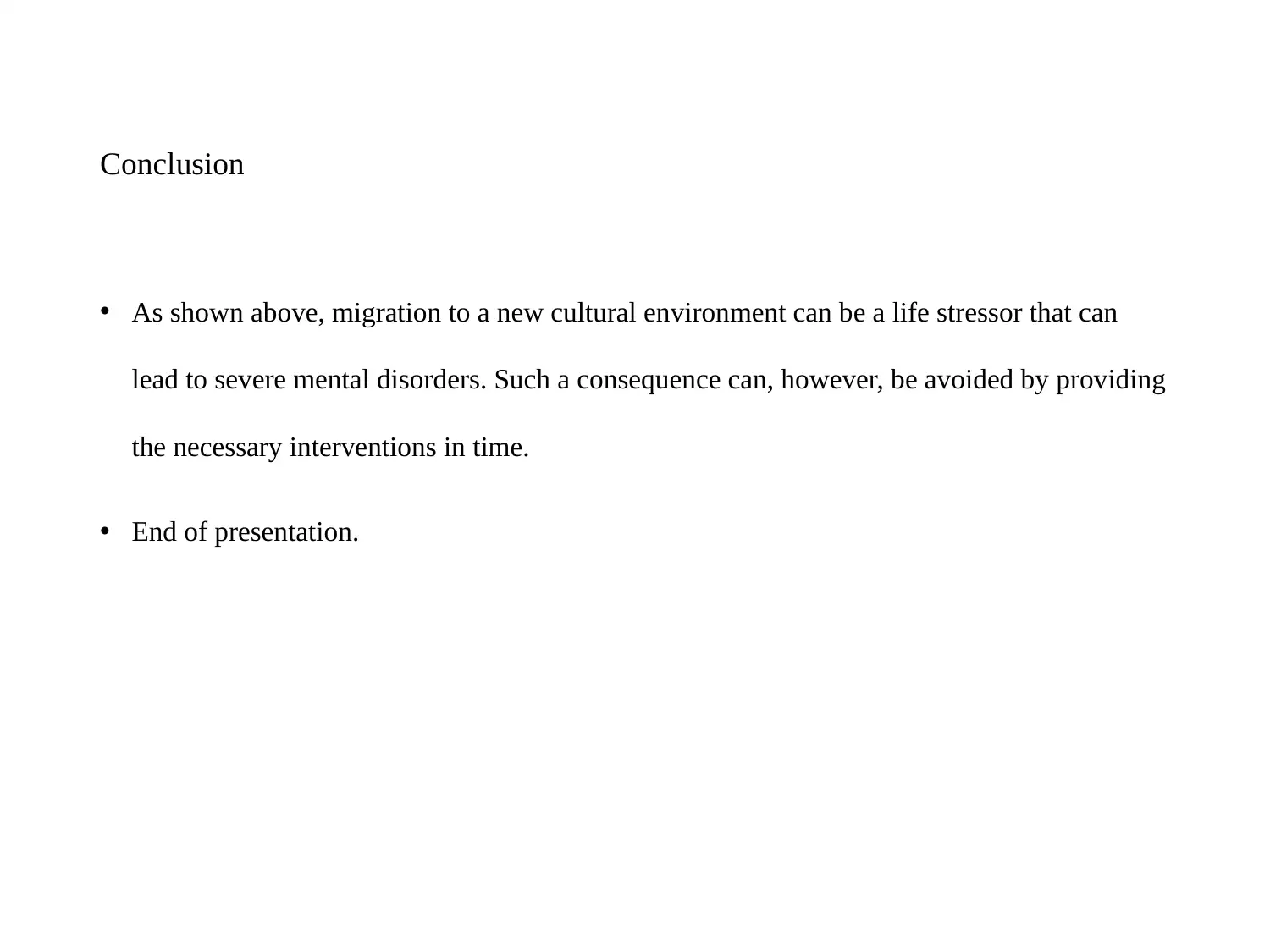
Conclusion
• As shown above, migration to a new cultural environment can be a life stressor that can
lead to severe mental disorders. Such a consequence can, however, be avoided by providing
the necessary interventions in time.
• End of presentation.
• As shown above, migration to a new cultural environment can be a life stressor that can
lead to severe mental disorders. Such a consequence can, however, be avoided by providing
the necessary interventions in time.
• End of presentation.
Paraphrase This Document
Need a fresh take? Get an instant paraphrase of this document with our AI Paraphraser
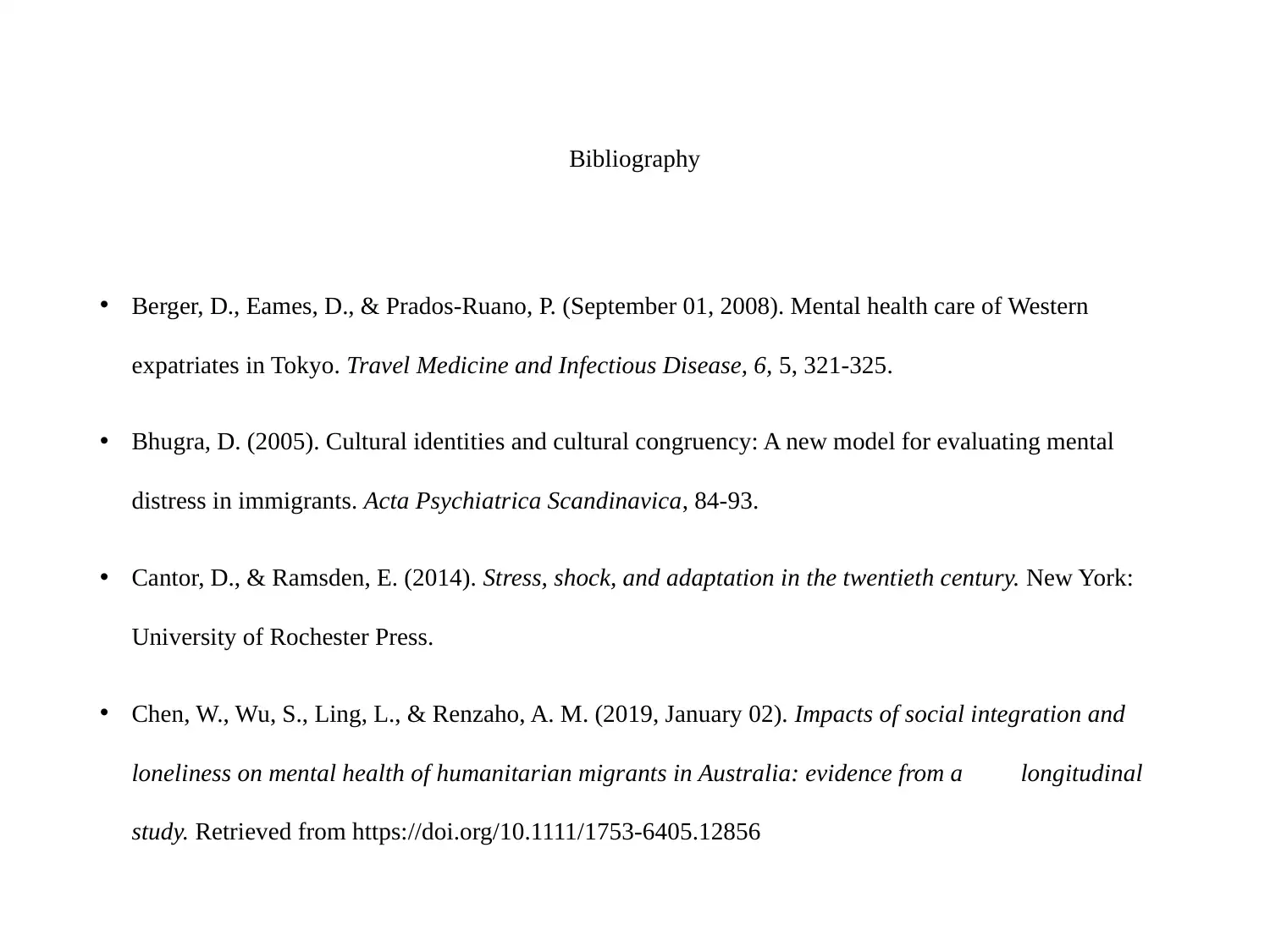
Bibliography
• Berger, D., Eames, D., & Prados-Ruano, P. (September 01, 2008). Mental health care of Western
expatriates in Tokyo. Travel Medicine and Infectious Disease, 6, 5, 321-325.
• Bhugra, D. (2005). Cultural identities and cultural congruency: A new model for evaluating mental
distress in immigrants. Acta Psychiatrica Scandinavica, 84-93.
• Cantor, D., & Ramsden, E. (2014). Stress, shock, and adaptation in the twentieth century. New York:
University of Rochester Press.
• Chen, W., Wu, S., Ling, L., & Renzaho, A. M. (2019, January 02). Impacts of social integration and
loneliness on mental health of humanitarian migrants in Australia: evidence from a longitudinal
study. Retrieved from https://doi.org/10.1111/1753-6405.12856
• Berger, D., Eames, D., & Prados-Ruano, P. (September 01, 2008). Mental health care of Western
expatriates in Tokyo. Travel Medicine and Infectious Disease, 6, 5, 321-325.
• Bhugra, D. (2005). Cultural identities and cultural congruency: A new model for evaluating mental
distress in immigrants. Acta Psychiatrica Scandinavica, 84-93.
• Cantor, D., & Ramsden, E. (2014). Stress, shock, and adaptation in the twentieth century. New York:
University of Rochester Press.
• Chen, W., Wu, S., Ling, L., & Renzaho, A. M. (2019, January 02). Impacts of social integration and
loneliness on mental health of humanitarian migrants in Australia: evidence from a longitudinal
study. Retrieved from https://doi.org/10.1111/1753-6405.12856
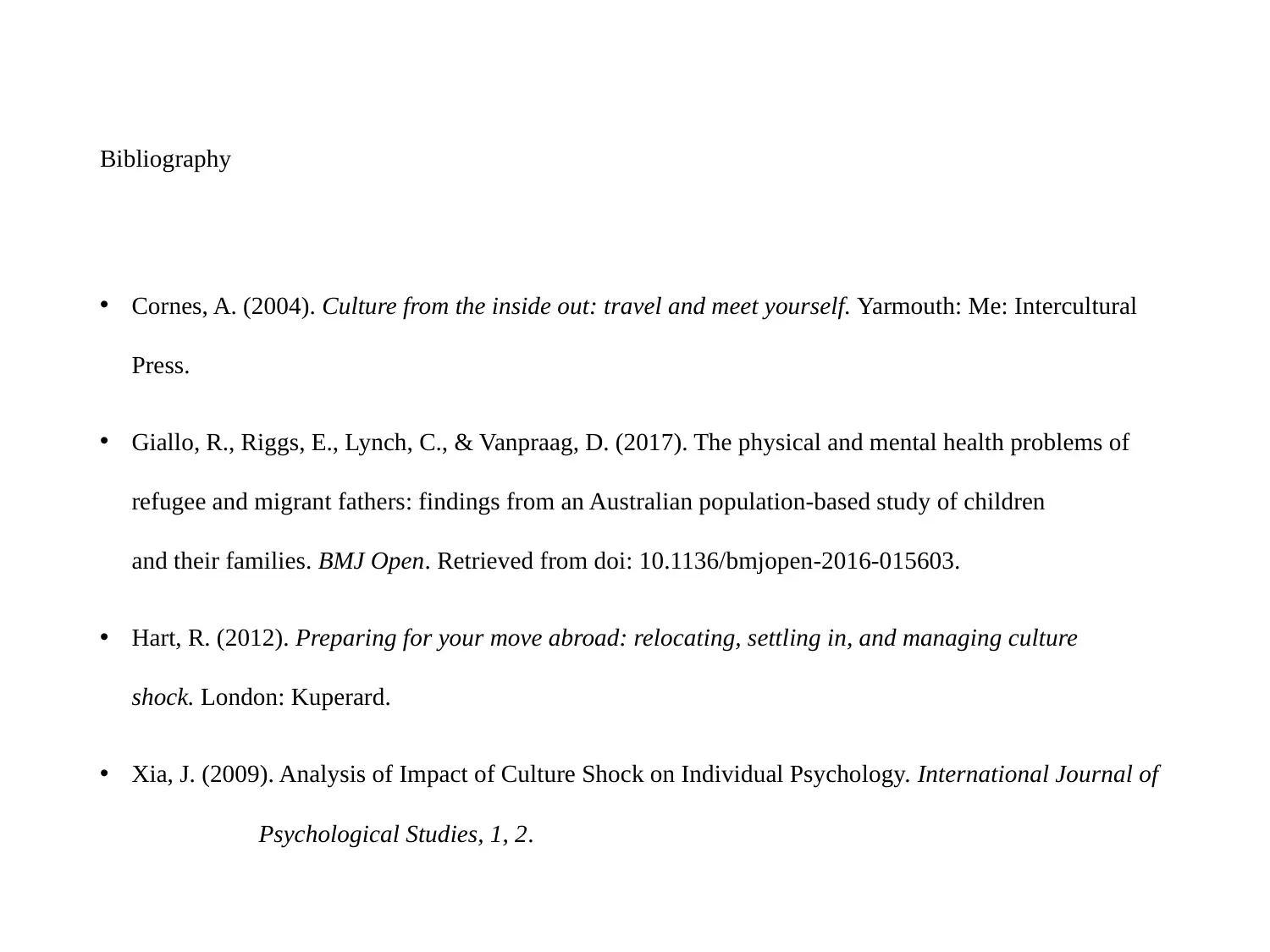
Bibliography
• Cornes, A. (2004). Culture from the inside out: travel and meet yourself. Yarmouth: Me: Intercultural
Press.
• Giallo, R., Riggs, E., Lynch, C., & Vanpraag, D. (2017). The physical and mental health problems of
refugee and migrant fathers: findings from an Australian population-based study of children
and their families. BMJ Open. Retrieved from doi: 10.1136/bmjopen-2016-015603.
• Hart, R. (2012). Preparing for your move abroad: relocating, settling in, and managing culture
shock. London: Kuperard.
• Xia, J. (2009). Analysis of Impact of Culture Shock on Individual Psychology. International Journal of
Psychological Studies, 1, 2.
• Cornes, A. (2004). Culture from the inside out: travel and meet yourself. Yarmouth: Me: Intercultural
Press.
• Giallo, R., Riggs, E., Lynch, C., & Vanpraag, D. (2017). The physical and mental health problems of
refugee and migrant fathers: findings from an Australian population-based study of children
and their families. BMJ Open. Retrieved from doi: 10.1136/bmjopen-2016-015603.
• Hart, R. (2012). Preparing for your move abroad: relocating, settling in, and managing culture
shock. London: Kuperard.
• Xia, J. (2009). Analysis of Impact of Culture Shock on Individual Psychology. International Journal of
Psychological Studies, 1, 2.
⊘ This is a preview!⊘
Do you want full access?
Subscribe today to unlock all pages.

Trusted by 1+ million students worldwide
1 out of 12
Related Documents
Your All-in-One AI-Powered Toolkit for Academic Success.
+13062052269
info@desklib.com
Available 24*7 on WhatsApp / Email
![[object Object]](/_next/static/media/star-bottom.7253800d.svg)
Unlock your academic potential
Copyright © 2020–2026 A2Z Services. All Rights Reserved. Developed and managed by ZUCOL.





